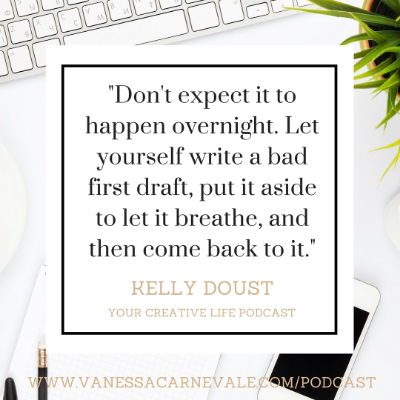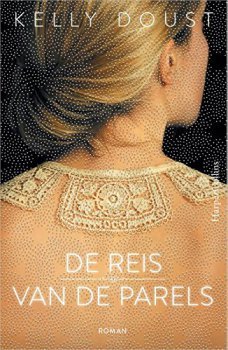Kelly Doust's Blog, page 2
December 31, 2016
December 18, 2016
Poem
Can you remember the last time you read a poem? When I heard this I realised it’s been too long. My yoga teacher shared this during savasana (corpse pose; the relax-at-the-end-bit of yoga practice) today and it so moved me:
In the end
you won’t be known
for the things you did,
or what you built,
or what you said.
You won’t even be known
for the love given
or the hearts saved,
because in the end you won’t be known.
You won’t be asked, by a vast creator full of light:
What did you do to be known?
You will be asked: Did you know it,
this place, this journey?
What there is to know can’t be written.
Something between the crispness of air
and the glint in her eye
and the texture of the orange peel.
What you’ll want a thousand years from now is this:
a memory that beats like a heart–
a travel memory, of what it was to walk here,
alive and warm and textured within.
Sweet brightness, aliveness, take-me-now-ness that is life.
You are here to pay attention. That is enough.
– Tara Sophia Mohr
You can read more about Tara and her work here.


A poem and a moment
Can you remember the last time you read a poem? When I heard this I realised it’s been too long. My yoga teacher shared this during savasana (corpse pose; the relax-at-the-end-bit of yoga practice) today and it so moved me:
In the end
you won’t be known
for the things you did,
or what you built,
or what you said.
You won’t even be known
for the love given
or the hearts saved,
because in the end you won’t be known.
You won’t be asked, by a vast creator full of light:
What did you do to be known?
You will be asked: Did you know it,
this place, this journey?
What there is to know can’t be written.
Something between the crispness of air
and the glint in her eye
and the texture of the orange peel.
What you’ll want a thousand years from now is this:
a memory that beats like a heart–
a travel memory, of what it was to walk here,
alive and warm and textured within.
Sweet brightness, aliveness, take-me-now-ness that is life.
You are here to pay attention. That is enough.
– Tara Sophia Mohr
You can read more about Tara and her work here.


December 16, 2016
Get bashed about a bit. Emerge better. Happy holidays.
[image error]
Cash-strapped: Viktor & Rolf’s post-recession red carpet beauty
Are you on holidays yet? I hope you are or will be soon. This year has been so full-throttle all the way, don’t you think – big shocks, uncertain energy and major world shifts… have you felt that closer to home as well?
Yesterday I finished up the contract position I’ve been doing all year, as maternity leave cover at an audiobook company. It’s the first full-time role I’ve had since Olive was born (she’s 8) and it was a huge change for us and my writing practice. I loved the people and I loved being back in the industry, but it was a hard year in lots of ways, too.
We renovated in 2015 and it’s been a necessity to have more income coming in. I don’t regret it, the Crafty Minx books came about because we were trying to find a new way of adjusting once we were saddled with the boring reality of a mortgage – it’s been nice having more coming in for a change… But the sad truth is that working like this has left me no time whatsoever to write. Apart from four days away back at the start of November (that was all the time I could manage, what with family commitments and work), I’ve made virtually zero progress on my follow-up to Precious Things, which was due earlier this year but had to be extended for submission by another six months (hence the writing retreat – HarperCollins is now looking to release the second novel in April 2018).
Which brings me to my point: for years I’ve been preaching in my books that all you need is a little scrap of time, nothing much at all really to be creative… to make something… to do… to write. But it’s not true.
Those who say they find time to write at 4am before their family’s up or at 7pm once the kids are in bed… I don’t know if we’re hearing the full picture because, hand on my heart I tried that (and on the weekends – not good), and I just couldn’t get that solid block of time to pour into feeling creative at all, without feeling like I was neglecting everything else. Maybe it’s easier for writers without kids? Because my writing (apart from those four days away) was cramped and left me feeling frustrated and mostly upset that I couldn’t spend more time with it. And the last time I had a habit of writing at 4am (while I was feeding a baby, what was I thinking?) I ran myself into the ground and had a completed book but almost 18 months camped out on the sofa with chronic fatigue to show for it. And I only have one child to look after.
So, what to do?
I’m still trying to find that elusive balance – trying to find a way to meet the most important needs (family, friends, creative life) as we all are. For now, I’ll be taking a much-needed break over Christmas and gearing up over the holidays to start writing again, or at least for a meaty chunk of time before I start my next freelance role. And I think full-time work when you mother, wife and want to write or pursue your creative path is pretty tricky.
But it can be done.
I met a beautiful, talented writer this year and she told me she writes one year on, one year off. This clever woman has three small kids. She has a part-time job in the philanthropic not-for-profit sector which she loves. So it is about making things work. Not every day, but over time.
Unless you’re an heiress. In which case, you probably want to hang about on yachts all day cruising the Greek Islands. Just saying, but I think all that leisure would get tiring, don’t you? No struggle, no pleasure. I honestly believe that.
“You normally have to be bashed about a bit by life to see the point of daffodils, sunsets and uneventful nice days.”
― Alain de Botton
Right on, Alain.
Love to you and yours for a peaceful holiday and 2017 ahead.
x


September 28, 2016
Better Reading Book Group live
The new Ann Patchett is breathtakingly beautiful. It’s always a pleasure to talk books with Better Reading but especially when it’s this good. Commonwealth‘s both funny, familiar and heartbreaking. Watch here for our live Facebook review last night (spoiler alert):


September 19, 2016
Fashion Meets Fiction Podcast
A few months back I was fortunate enough to be interviewed by the lovely Kimberley Foster from the Your Creative Life podcast. Please click here to listen to the interview on iTunes.


August 15, 2016
Fashion Meets Fiction Podcast
A few months back I was fortunate enough to be interviewed by the lovely Kimberley Foster from the Your Creative Life podcast. Please click here to listen to the interview on iTunes.


June 15, 2016
De reis van de parels
Precious Things will be published in Holland next month… squeee! More info below, and to order click here.
BESCHRIJVING
Normandië, 1891: een jonge vrouw naait kleine pareltjes op de kraag van haar trouwjurk. Ze huilt.
Shanghai, 1926: sensuele danssensatie Zephyr vindt een met parels versierde haarband op de vloer van een balzaal. Ze neemt de band mee naar Maleisië, waar ze een gevaarlijke liaison aangaat.
Istanboel, 1974: een model wordt op de foto gezet met een bijzondere tiara in het haar.
Londen, nu: Maggie – vrouw, moeder, stiefmoeder, medewerker in een veilinghuis – vindt in een nalatenschap een verkreukelde, verwaarloosde diadeem. Getroffen door de subtiele pareltjes wil ze achterhalen waar dit sieraad vandaan komt.
De reis van de parelsvertelt het verhaal van een prachtig sieraad en
zijn reis door de tijd in de handen van de vrouwen die het liefhadden en weer verloren – en de vrouw die betoverd raakt door zijn mysterieuze verleden.
‘Een betoverende en subliem vertelde roman over hoe onze geheimen verweven
zijn met onze meest dierbare spullen.’ – Sky News


June 12, 2016
Adventures in audio

We hear about people making big life changes all the time, but how do you know when you’re having an epiphany? In my experience, most lightbulb moments have been more like the faint glow that seeps in around the blinds at dawn, until it gets so bright you can’t comfortably hang around in bed any longer.
Steve Jobs said, “You can’t connect the dots looking forward; you can only connect them looking backwards. So you have to trust that the dots will somehow connect your future.”
A couple of years ago some things fell away for me. I wouldn’t say it was as dramatic as life falling apart, but it certainly felt like some sort of momentous change was occurring, and it was pretty hard to accept at the time.
I’ve often thought that if I couldn’t write I’d be a mess, but I didn’t consider that it’s reading – not writing – that fills me up the most. Exercise is one of those things that I also really need. It helps me stay sane through fairly sedentary days in front of the computer, but two years ago I found myself in a rubbish situation: unable to write, unable to train and, most painfully, unable to read.
I’ve heard that sometimes what’s going on externally mirrors what’s going on inside. Well, back then I just seemed to keep having car accidents. Several accidents in a twelve-month period, and I wasn’t sure how. I didn’t see things coming; probably because I wasn’t looking or being careful enough, and I injured myself. It wasn’t too severe at first, but I kept exercising through the pain, telling myself it was fine, until things got so bad I couldn’t do much at all.
I practically couldn’t move – not without screaming. I spent several months mostly on my back, with spasms travelling up and down my spine after tearing a disc in my neck. I couldn’t drive, I couldn’t cook, I couldn’t write or hug my daughter or use a phone, and then I couldn’t read because it hurt to hold up a book, the pain travelling all the way up my neck and bringing me to tears. All the things that made life important were just beyond reach.
You’d think this would be indication enough that things had to change, but at first I just kept going, trying to do what I’d always done and work through it. Things got even worse before they got better, and they didn’t start improving until I simply gave up. Just released myself from the expectation that I would achieve anything in a day apart from getting from one end of it to the other. Thankfully my husband took up the slack and helped our household operate – I don’t know what I would have done had he not been able to.
Around that time, I started listening to podcasts. It was a way to stem the considerable boredom and made me feel like I was still learning something and taking part in the world. I’ve always loved listening to music and radio but I needed something meatier to sink my teeth into. I listened to a huge amount of podcasts – mostly TED talks and YouTube addresses and conversation hours – and then moved on to Serial and The Good Life Project and Dear Sugar Radio. Finally, I listened to a few audiobooks and marvelled at how enjoyable it was to fill up my spare moments with other people’s thoughts rather than dwelling upon the endless loop of my own which often preoccupied me.
I eventually got back to writing and finished my first novel, Precious Things, and I still kept listening to audio – almost as much as I used to read previously, because I could do it while I was doing other things, like walking and preparing dinner and tidying the house. I know I multitask too much, but it seemed more satisfying than having that nagging feeling I wasn’t getting enough reading in because life was just too busy.
Before my novel was published, my agent Jane sold the rights to turn it into an audiobook, which I previously wouldn’t have considered a possibility. And only a few months later, I saw a job advertised for an acquisitions person at an audiobook company. This is where the dots started to connect.
I started work just before Precious Things was published, which was brilliant because it meant I didn’t have time to stress about things I can’t control, such as the sales figures for my book or how it would be received. It also meant I could channel everything I’d learned from the audio I’d been listening to over the last couple of years into the books I started to acquire.
Now I spend my days reading and bidding on books I really love, which I know will make great audiobooks – especially for people who are blind or unable to read for whatever reason. But I’ve also learned that it’s not just the incapacitated who listen to a lot of audio. Did you know that it’s mostly farmers – male farmers – who download all those rural romance books which are so popular at the moment? I didn’t, but it’s true – the library figures support it. And it is truckers who will listen to pretty much anything while they’re pulling long haul journeys, bringing creativity and inspiration to what I previously considered a gruelling job.
My new position covers maternity leave, so it’s only mine until December or perhaps longer if my predecessor decides to take a full year off, but I’m enjoying it while it lasts and writing on the weekends and in the evenings. It strikes me as odd the way things have worked out – had I not listened to so much audio while I was injured, I’m not sure I would have applied, and I’m finding it really rewarding.
Which is proof that the biggest challenges have some meaning, beyond just messing with your head. That period also forced me to think more laterally about what constitutes a decent life, and the ‘proper’ way to do things. I think I may have been in a bit of a rut beforehand, but it opened up wider possibilities. All grist to the mill for novel two, methinks!


April 2, 2016
Fairfax interview for SMH, The Age & Canberra Times
A few weeks ago I had a lovely chat with Canberra Times journalist Karen Hardy about writing Precious Things. Here’s the resulting article, which was syndicated across Fairfax newspapers last weekend:
Kelly Doust’s love of fashion finds its way
into her novel Precious Things
Photo by Amanda Prior shot on location at Ruby Star Traders, Glebe
By Karen HARDY
2 April 2016
Kelly Doust is the first to admit she has a weakness for vintage clothes.
She has always been intrigued by the history of a piece, who wore it, their story, and what first drew them to that dress or jacket.
“Ever since I was about 12 years old, I’ve been collecting old frocks,” says Doust. “I’d take whatever fashion magazine I could find to Vinnies and try and recreate certain looks.
“I’d find these amazing dresses which looked like they’d never even been worn and I’d wonder who the women were who owned them.”
But with the collecting comes the editing process – wardrobes “bursting at the seams” takes on a different meaning when it comes to fashion – and one day she was selling some pieces at a flea market and she found herself wondering about the new lives her old clothes might lead.
“One day I’ll write a book just like Annie Proulx’s Accordion Crimes, or the film The Red Violin, about a cheeky little frock who gets about and lives in more cities than I ever will. Wouldn’t that be fun?” she wrote on her blog later than afternoon.
A few weeks later, she received an email from a publisher friend asking her if she’d really be interested in such a project. And the seed for the novel Precious Things was planted.
As the author of several non-fiction books about vintage clothes, craft and recycling, including the best-selling A Life in Frocks: A memoir and The Crafty Minx: Creative recycling and handmade treasures, Doust had always dreamed of writing fiction.
“But I’m enough of a realist to know that fiction is a totally different process to non-fiction. I had all these lovely ideas and stories, but I didn’t have a solid plot, or any real idea of how to get from A to B.”
But then she stumbled across her hero piece. She was visiting her friend, artist Jessica Guthrie, who used to own a vintage clothing store, Coco Repose, and saw a beaded headpiece.
“I couldn’t stop thinking about it, it enchanted and inspired me,” Doust says.
“How many different adventures had it seen in its lifetime? It might have originally been a collar on a wedding gown, but then refashioned into a crown or a choker. It could have been worn as a bracelet wrapped around a girl’s wrist or added as a bodice detail to a latter-day dress. Or displayed as art upon the wall.”
In Precious Things, it becomes a collar, and we follow its journey from Normandy in 1891, as a young girl sews her wedding dress; to Shanghai, in the 1920s, where it belongs to a flamboyant circus performer; in the 1950s it belongs to an artist’s muse.
At the centre of the story, however is a totally modern woman, Maggie, an auctioneer, juggling marriage, children and a demanding job, who finds the crumpled, neglected collar in a box of junk and sets out to discover more about its past.
Doust loved researching the historical aspects of the novel, indeed is fascinated by how fashion reflects the changing lives of women through the ages.
“Through research I’d done for a previous book, Minxy Vintage, I’d already learned how intrinsic the link is between fashion and social change, and wanted to explore this further,” she says.
“It’s far more than just hemlines lowering or raising with the economy – the women of the 1920s chose to cast off the restrictive, corseted styles of the Belle Epoque in favour of a sportier aesthetic.
“This was championed by Coco Chanel in Paris fashion, but only occurred in the mainstream because women were finally entering the workplace and taking on men’s work.”
Doust is already working on a second novel which has many similar themes: family; women looking for love, direction and purpose; history and fashion.
“I think I’ll always weave my books around these themes to a lesser or greater degree because that’s what I love, and because the question of, ‘What am I going to wear today?’, is such an enduring, constant preoccupation for many of us.”









